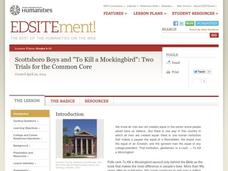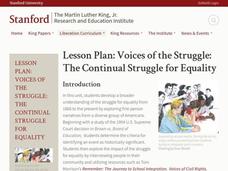Curated OER
What Can You Find in the Cabinet?
Looking in the cabinet can be fascinating! Examine the various departments of the Executive Cabinet in this group research project, which jigsaws so each small group has a different department and presents to the class. Groups create...
Utah State Courts
Judges in the Classroom
Class members explore the process of a disposition hearing for juveniles, particularly looking at how the judge decides what sentence the juvenile offender should receive. Task your pupils with evaluating different sample cases provided...
Curated OER
Espionage and Sedition Acts: Mock Trial
Bring to life the severity of the Espionage and Sedition Acts through a mock trial. Learners have prior knowledge of WWI and the context of these acts. An anticipatory set gets the class discussing the ethics of wartime dissension, and...
Curated OER
Symbolic Speech
Ninth graders consider the right of freedom of speech as it is outlined in the U.S. Constitution. They receive background information for the US Supreme Court, the Bill of Rights, and free speech. They discuss a series of actual cases...
Curated OER
Laws...Who Needs Them?
Who needs laws? Junior high schoolers sure do! Provide your 7th-9th graders with an understandng about why laws are important and how they are used to create a functioning society. Learners use a series of handouts and readings to build...
Curated OER
Arrest- A Legal System Simulation
What would your class do if a police officer arrested a student in class? This is exactly the anticipatory set that gets students engaged in a unit on the legal system. The plan is to get the officer to simulate an arrest, and then guest...
Learning for Justice
Mary Church Terrell
Excerpts from an 1898 speech by civil rights activist Mary Church Terrell offers young scholars an opportunity to investigate how Black American women fought for civil rights long before Rosa Parks and the civil rights movement of the...
Learning for Justice
The Color of Law: Winners and Losers in the Job Market
The second lesson in "The Color of Law" shows how government policies supported economic inequality. Scholars read additional excerpts and respond to text-dependent questions from "The Color of Law" text, examine primary source documents...
Learning for Justice
The Color of Law: Developing the White Middle Class
The final lesson in the "Color of Law" series explores the government's discriminatory economic policies. Young scholars watch videos, read primary source materials, and examine images to gather information. They discuss how what they...
Anti-Defamation League
Major League Baseball and the Negro Leagues: Correcting an Injustice
It's been a long time coming! In 2020, MLB Commissioner Robert D. Manifred, Jr. stated that "the Negro Leagues would be recognized as official major leagues." Middle schoolers investigate the history of the Negro Leagues and use evidence...
Center for Civic Education
Lesson 2: Suffrage Amendments
Youngsters examine selected amendments to the Constitution to determine how voting requirements in the US have changed from the colonial days to the present.
Center for Civic Education
Lesson 3: Becoming a Voter
Who is eligible to vote in your state? Class members examine their states' voting qualifications, complete sample voter registration forms, and chart the elections scheduled.
Achieve The Core
Linda R. Monk, Words We Live By: Your Annotated Guide to the Constitution - Grade 8
“We the people . . .” Thus begins the Preamble to the Constitution. Using a close reading approach, class members examine an excerpt from Linda Monk’s article that traces how the interpretation of these words has evolved. Some of your...
National Endowment for the Humanities
Scottsboro Boys and "To Kill a Mockingbird": Two Trials for the Common Core
Here's a must-have resource for anyone reading To Kill A Mockingbird or using Harper Lee's award-winning novel in a classroom. The packet contains Miss Hollace Ransdall's first-hand, factual account of the trials of the Scottsboro Boys,...
Stanford University
Voices of the Struggle: The Continual Struggle for Equality
As part of a study of the Civil Rights Movement from 1868 to the present, class members examine first person narratives, the Supreme Court case Brown v. Board of Education, and other significant events in civil rights history. They then...
Center for Civic Education
The Equal Rights Amendment in the 1970s and Today
Discover the fascinating history of the Equal Rights Amendment and discuss the major implications and considerations associated with it today. Here you will find background information on the topic, a graphic organizer summarizing...
Carolina K-12
Are You a Democrat or a Republican? Are You Really?
Have new or soon-to-be voters examine different political parties and their platforms as they figure out which one aligns most with their beliefs. After taking a few online quizzes, students split into pairs to discuss and then in larger...
National Endowment for the Humanities
Martin Luther King, Jr. and Nonviolent Resistance
Was nonviolent resistance the best means of securing civil rights for black Americans in the 1960s? In this highly engaging and informative lesson, your young historians will closely analyze several key documents from the civil rights...
National Geographic
Rivers and the Gabcikovo-Nagymaros Project
Damming rivers has been a case of necessity versus negative environmental impact since the process began. Kids take on the role of a stakeholder in the proposed damming of the Danube River. They begin by reading arguments for and against...
iCivics
The “Supreme” in Supreme Court
Does a public school have the right to restrict what t-shirts learners wear? Discover what happened when this question was brought to the Supreme Court, and review other major cases in United States history involving judicial review....
Center for Civic Education
The Power of Nonviolence: Rosa Parks: A Quest for Equal Protection Under the Law
Teach young historians about the historical legacy of Rosa Parks with a multi-faceted lesson plan. Pupils follow stations and use journals to explore prominent events, analyze primary resource documents, and engage in interesting...
Smithsonian Institution
General George Washington, Military Leader
Teach pupils the characteristics that make George Washington such an effective leader, especially in context of his time period. Scholars view artifacts, participate in group work, create lists, compare and contrast, and discuss as a...
US National Archives
Documented Rights Educational Lesson Plan
How have groups struggled to have their unalienable rights recognized in the United States? Acting as a research team for the Human Rights Council of the United Nations, your young historians will break into groups to research how people...
Foreign Policy Research Institute
Democracy Wall
How free are people in the United States, or in the world for that matter? The class reads and compares two articles that discuss levels of freedom enjoyed by different people around the globe. They discuss why some people have more...
Other popular searches
- And Social Justice
- Math and Social Justice
- Art and Social Justice
- Latino Social Justice
- Social Justice Lesson Plan
- Peace and Social Justice
- Music and Social Justice
- Rap and Social Justice
- Steps for Social Justice
- Economic and Social Justice
- Science and Social Justice
- Equality and Social Justice

























